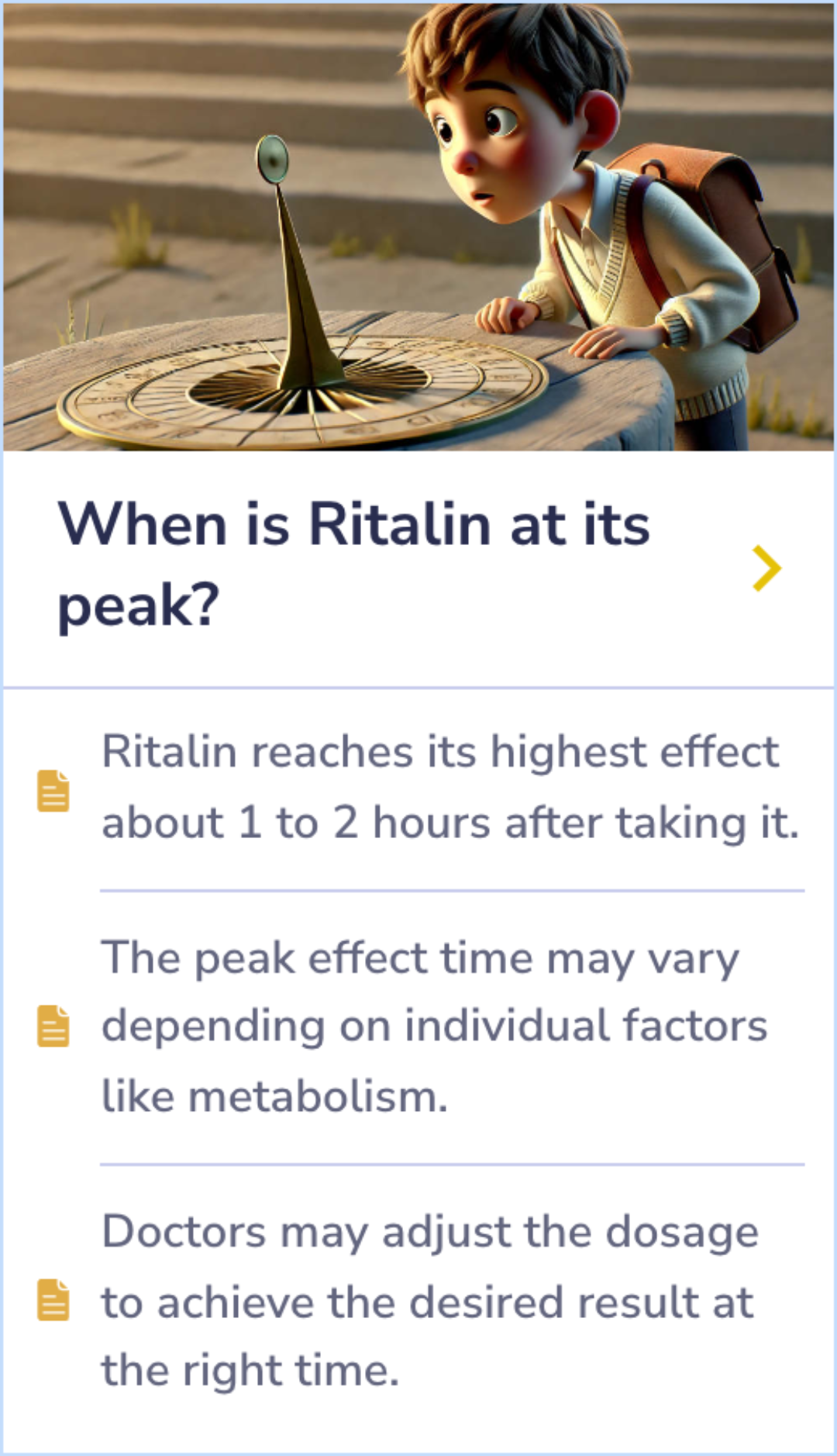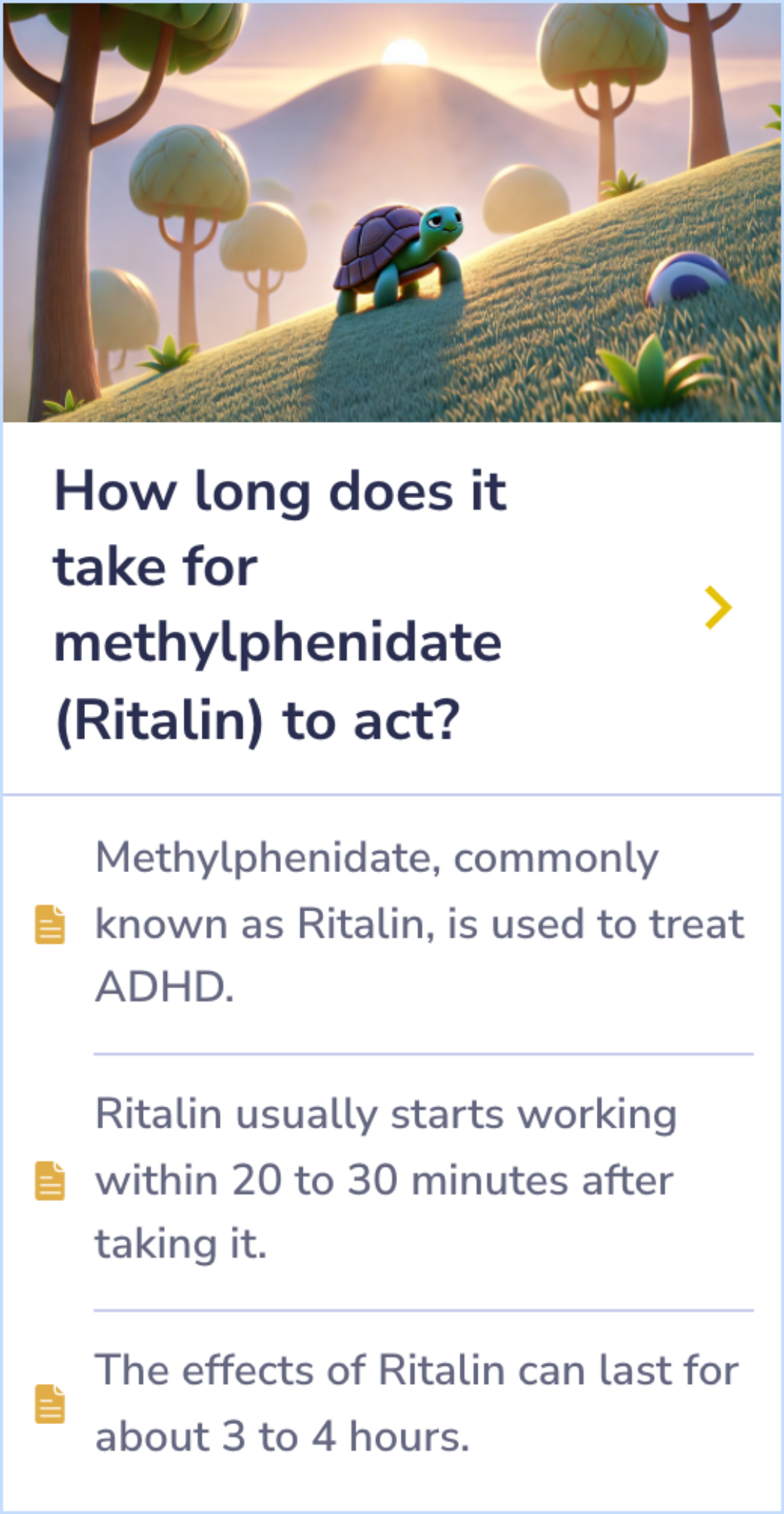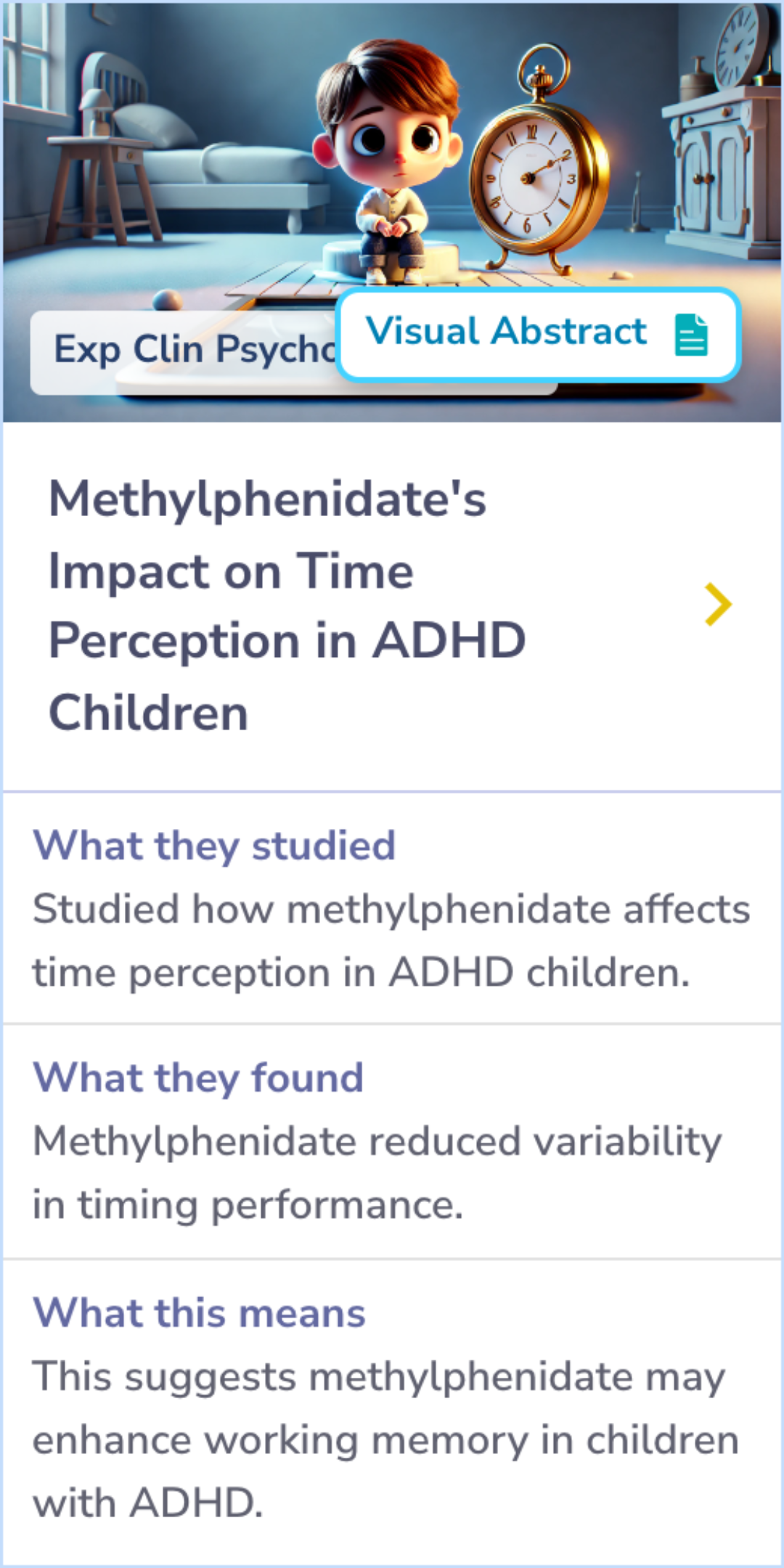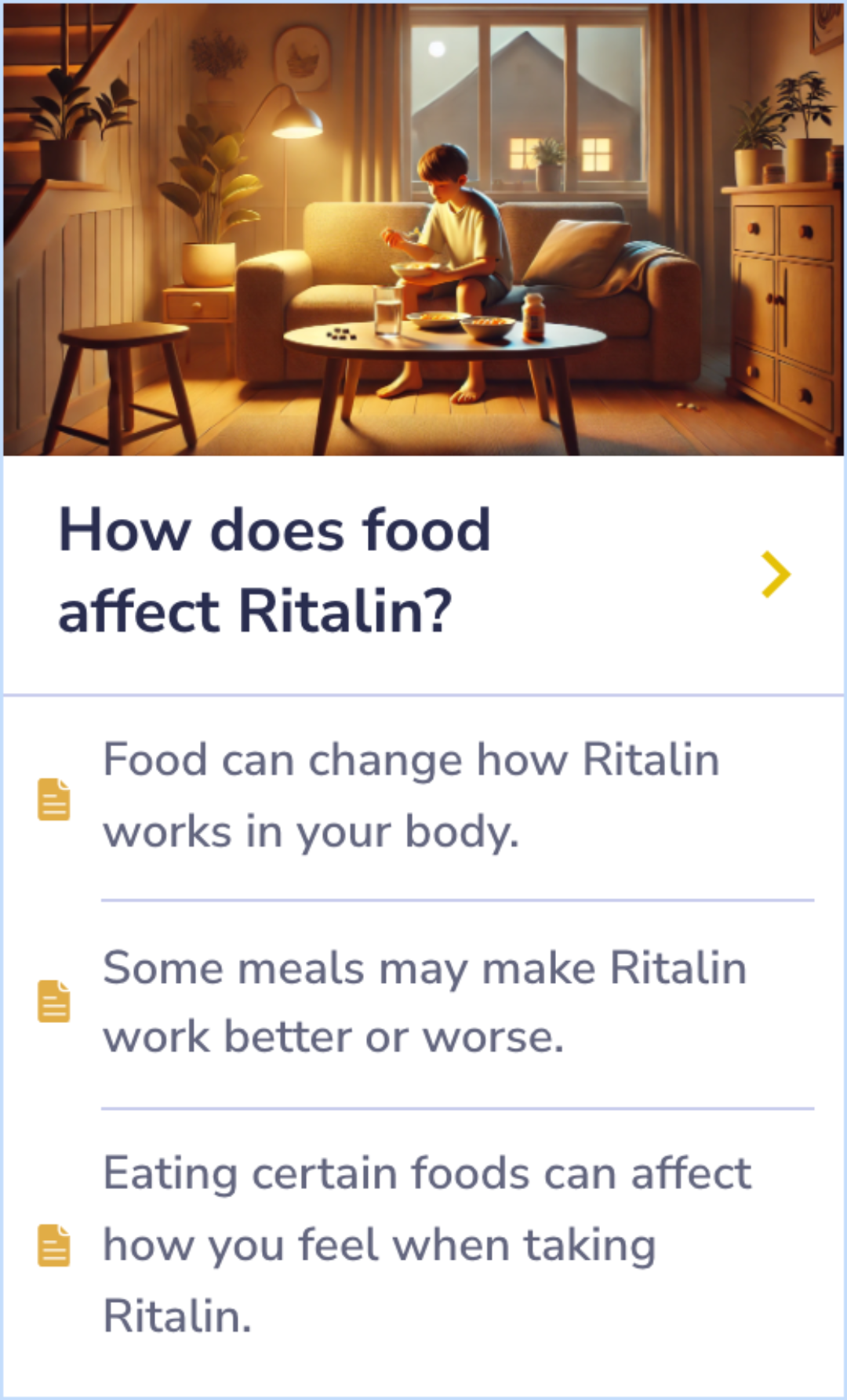Ritalin
Evidence Based Answers
Should I take Ritalin after 4PM in the afternoon?
Ritalin without ADHD can still enhance focus, but it also brings risks like jitteriness, anxiety, and sleep problems, particularly if taken late in the day.
Published: November 4, 2024
Click to explore a section:
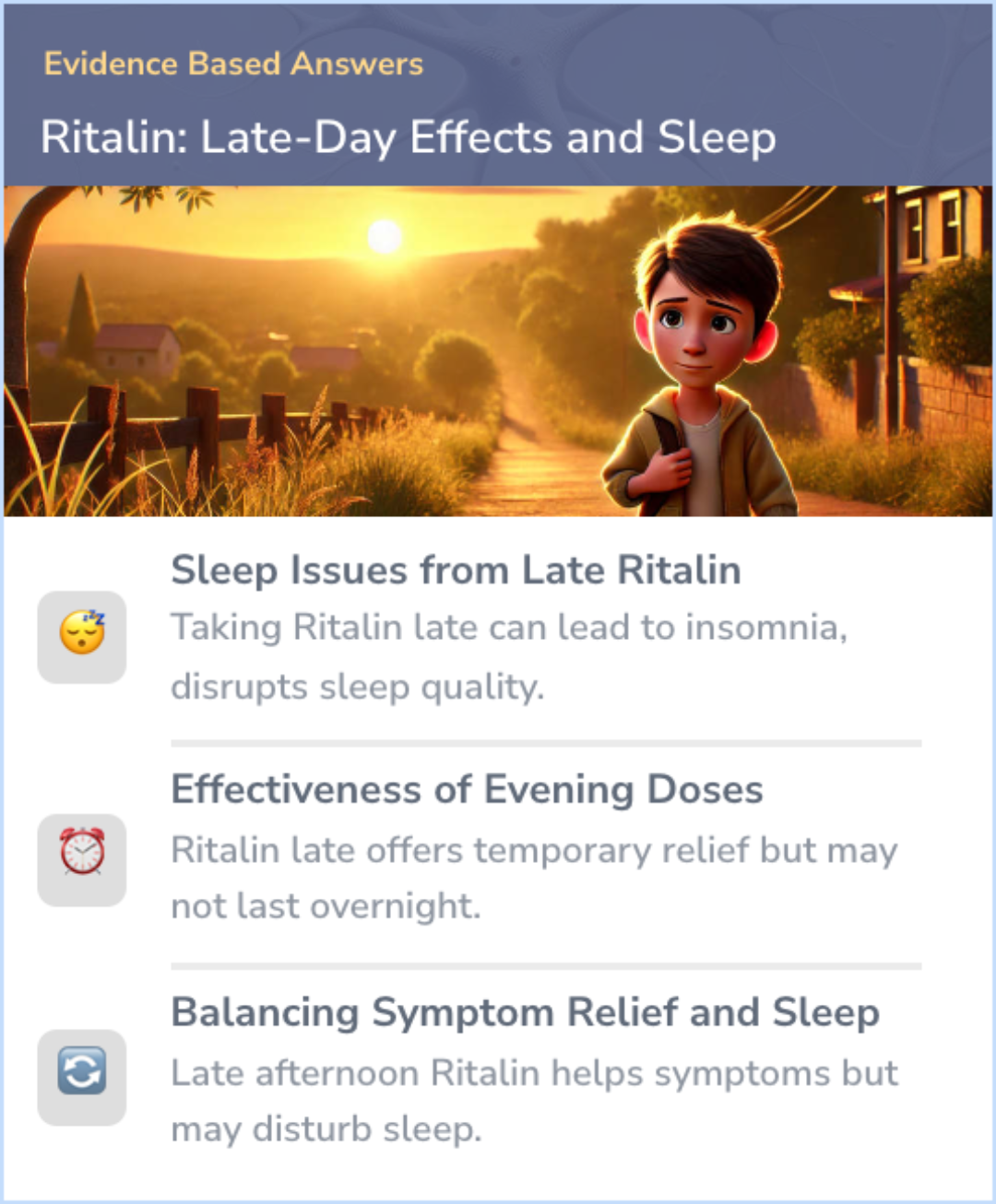
Late-day Ritalin can disrupt sleep, offers temporary relief, and needs balance between symptom aid and sleep disturbances.
Background: Adult Instructions
Ritalin should be taken 2-3 times per day, ideally 30-45 minutes before a meal. This schedule helps manage symptoms effectively throughout the day.
For SR (sustained-release) tablets, the effects last around 8 hours. It's optimal to avoid taking Ritalin late to prevent difficulty sleeping, suggesting the last dose should be before 4PM.
For SR (sustained-release) tablets, the effects last around 8 hours. It's optimal to avoid taking Ritalin late to prevent difficulty sleeping, suggesting the last dose should be before 4PM.
Personal Experiences
Perspectives: Ritalin in the Late Afternoon: Balancing Effectiveness and Sleep
When it comes to taking Ritalin after 4PM, opinions vary widely. Some find a later dose essential for evening productivity or managing 'crashes' from earlier doses.
Others caution that taking Ritalin late can interfere with sleep or lead to increased tolerance, recommending an earlier schedule or alternatives if issues arise.
Others caution that taking Ritalin late can interfere with sleep or lead to increased tolerance, recommending an earlier schedule or alternatives if issues arise.
Reddit: u/Affectionate-Dingo69
We do Ritalin LA in the morning before school and a small dose of regular Ritalin around 2:30/3. It helps with homework and after school activities. We noticed a harsh come down and asked for a small afternoon dose.How Late-Day Ritalin Affects Sleep
Taking Ritalin after 4 pm can impact sleep because it is a stimulant, which may lead to side effects like insomnia and nervousness. These effects are more common when Ritalin is taken later in the day, particularly in the afternoon or evening.
For individuals experiencing sleep disruptions, reducing the dosage or avoiding evening doses can help lessen these issues. Most guidelines recommend taking the last dose before 6 pm to allow the medication to wear off by bedtime, as late doses may affect the ability to fall asleep and overall sleep quality.
For individuals experiencing sleep disruptions, reducing the dosage or avoiding evening doses can help lessen these issues. Most guidelines recommend taking the last dose before 6 pm to allow the medication to wear off by bedtime, as late doses may affect the ability to fall asleep and overall sleep quality.
“
Source Quotes:
Nervousness and insomnia are the most common adverse reactions but are usually controlled by reducing dosage and omitting the drug in the afternoon or evening.,Patients who are unable to sleep if medication is taken late in the day should take the last dose before 6 p.m.
Insomnia and nervousness are the most commonly reported adverse effects in patients using methylphenidate.
Does Ritalin Work if Taken Late in the Day?
Ritalin’s effects are strongest within 1.5 to 2 hours after taking it and decline quickly, lasting around 4 hours per dose. When taken after 4 pm, Ritalin may provide temporary relief but is unlikely to last through the night.
For those needing longer-lasting relief, other formulations that provide a steady effect may be a better choice than immediate-release doses taken in the evening.
For those needing longer-lasting relief, other formulations that provide a steady effect may be a better choice than immediate-release doses taken in the evening.
“
Source Quotes:
The therapeutic effects parallel the serum concentration of immediate-release methylphenidate, with a maximum reduction in ADHD symptoms about 1.5 to 2 hours after dosing followed by a decline that is sufficient to require another dose about 4 hours after the first to reestablish full efficacy.
Time of peak plasma concentration: 1.9 hours for immediate-release tablets.
Managing Evening Symptoms with Ritalin and Possible Sleep Impacts
Taking Ritalin in the late afternoon can help with evening symptoms but increases the risk of sleep issues due to its stimulating effects. While taking Ritalin with food may improve its absorption, dosing near dinner or evening meals can extend its presence and raise the chance of sleep-related side effects.
Late-day Ritalin should be carefully timed to balance evening symptom relief with the potential for sleep disturbances.
Late-day Ritalin should be carefully timed to balance evening symptom relief with the potential for sleep disturbances.
“
Source Quotes:
Patients who are unable to sleep if medication is taken late in the day should take the last dose before 6 p.m.
Absorption seems to be enhanced when methylphenidate is taken with food.
Key Takeaways
Conclusions
Taking Ritalin after 4 PM raises the chance of sleep disturbances due to its stimulating effects, like insomnia and nervousness.
Its strongest impact occurs shortly after consumption, offering only temporary relief but rarely lasting through the night. Guidelines often suggest ceasing doses before 6 PM to enhance sleep quality and balance symptom relief.
Its strongest impact occurs shortly after consumption, offering only temporary relief but rarely lasting through the night. Guidelines often suggest ceasing doses before 6 PM to enhance sleep quality and balance symptom relief.

Evidence Summary
Timing Ritalin’s Peak Effect for Best Results
Ritalin generally reaches its peak effect between 1 to 2 hours after taking it, though this timing can vary based on personal factors, such as metabolism.
Doctors may fine-tune doses to help individuals experience Ritalin’s effects at the most beneficial time for their needs, adjusting as necessary to find the right balance for each person.
Doctors may fine-tune doses to help individuals experience Ritalin’s effects at the most beneficial time for their needs, adjusting as necessary to find the right balance for each person.
Evidence Summary
Quick-Acting Relief: How Ritalin Fits Into Daily Life
Ritalin, a common ADHD medication, starts working quickly, usually within 20 to 30 minutes. Its effects provide a short window, lasting about 3 to 4 hours, allowing for targeted symptom relief during crucial parts of the day.
Planning doses around this timing helps manage daily routines and achieve a smoother schedule for activities that require focus and attention.
Planning doses around this timing helps manage daily routines and achieve a smoother schedule for activities that require focus and attention.
Evidence Summary
Methylphenidate’s Impact on Timing Consistency in ADHD
Children with ADHD were tasked with holding a lever down for a set time while on and off methylphenidate (MPH). MPH didn’t change the overall number of correct lever holds or the average hold duration, but it did make timing more consistent.
The medication led to fewer extremely short holds and more holds within a 10 to 11-second range, showing improved control over timing.
This suggests MPH may help with timing consistency, a challenge for many with ADHD, without affecting how long they can hold the lever on average.
The medication led to fewer extremely short holds and more holds within a 10 to 11-second range, showing improved control over timing.
This suggests MPH may help with timing consistency, a challenge for many with ADHD, without affecting how long they can hold the lever on average.
Evidence Summary
How Food Influences Ritalin’s Effects
Different types of meals can affect how Ritalin interacts with your body, sometimes strengthening or weakening its impact. Eating certain foods can also influence how you feel while taking the medication, as these changes can alter how Ritalin works.
Adjusting your diet may make a difference in how Ritalin affects you, especially if consistency is a goal. For some, a specific meal routine could lead to steadier effects, echoing the idea of reliable dosing patterns discussed earlier.
Adjusting your diet may make a difference in how Ritalin affects you, especially if consistency is a goal. For some, a specific meal routine could lead to steadier effects, echoing the idea of reliable dosing patterns discussed earlier.
